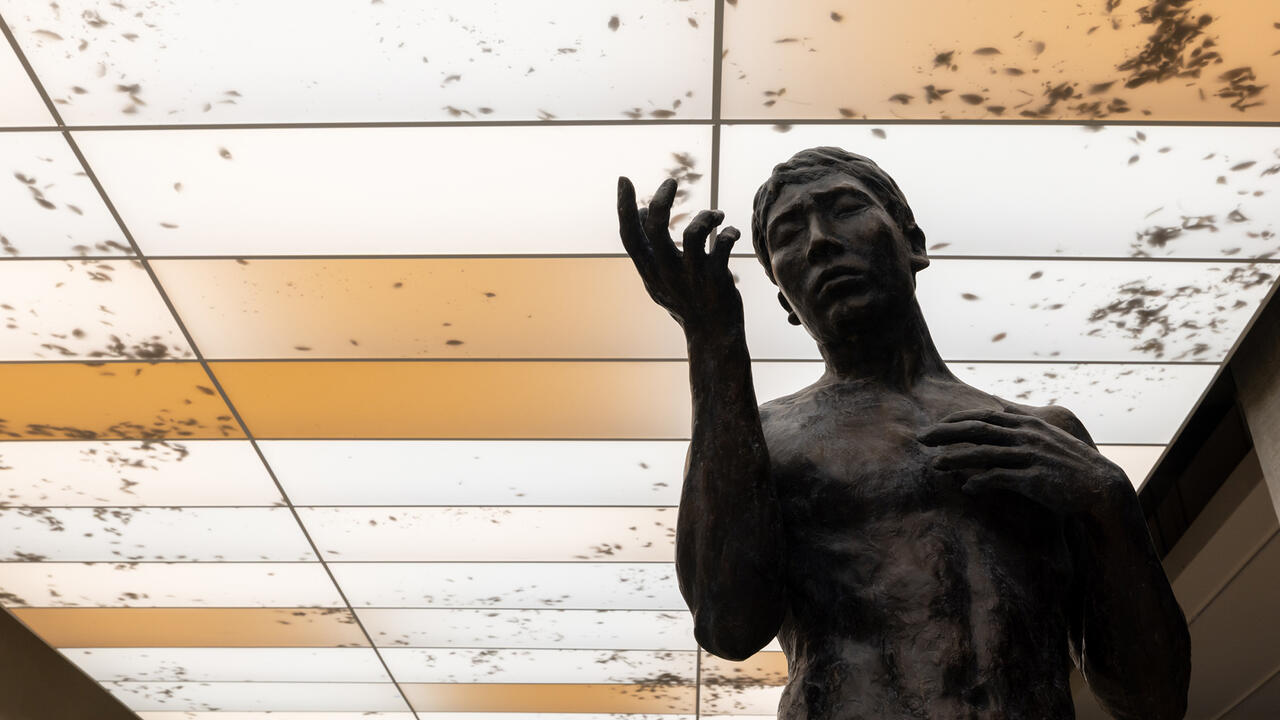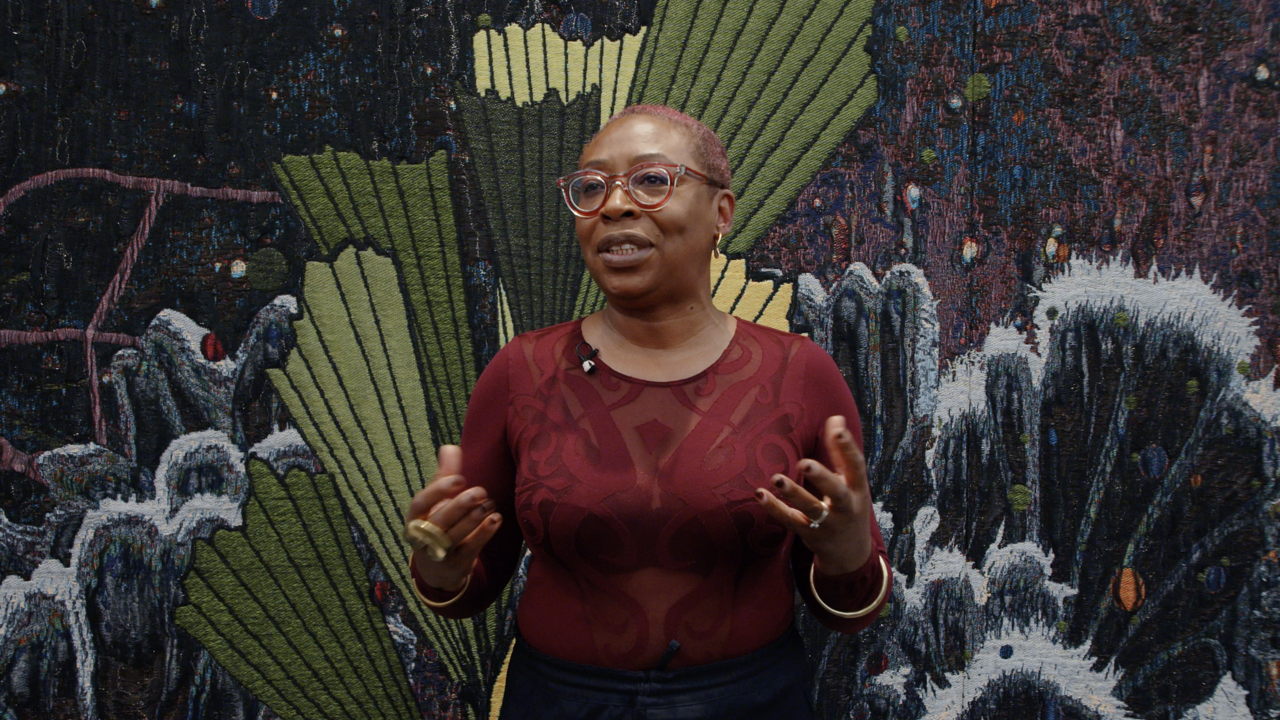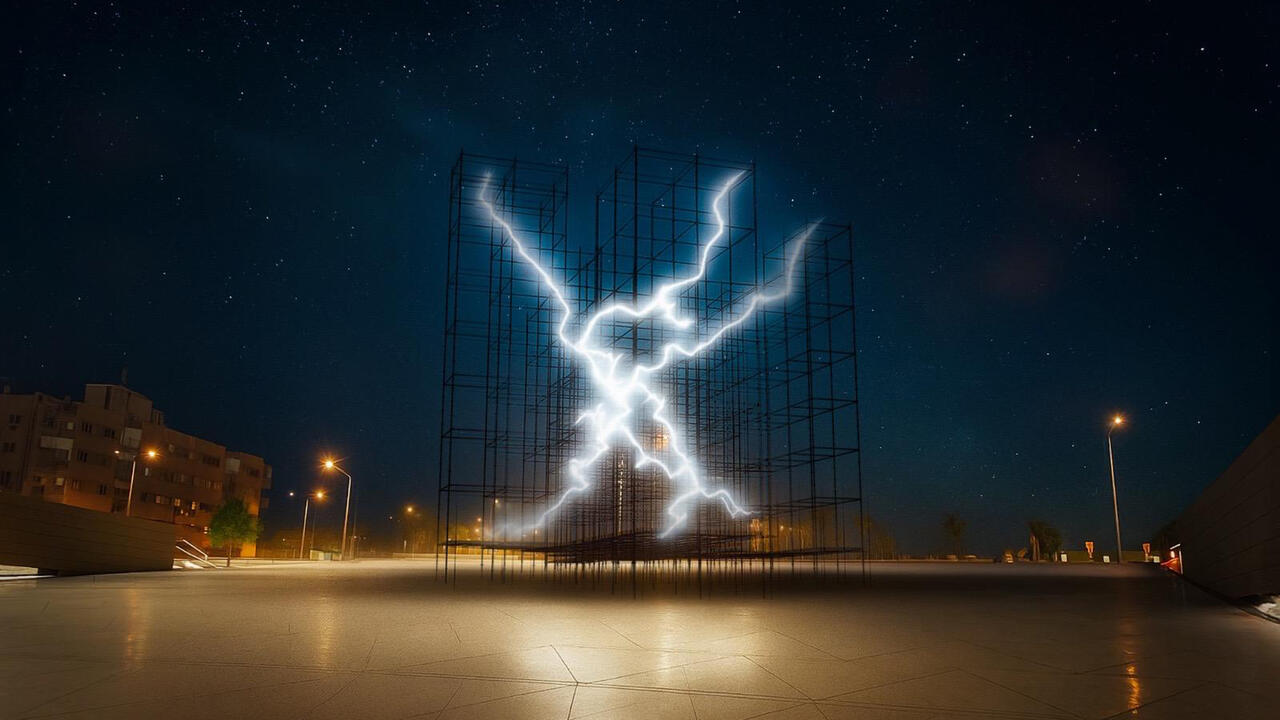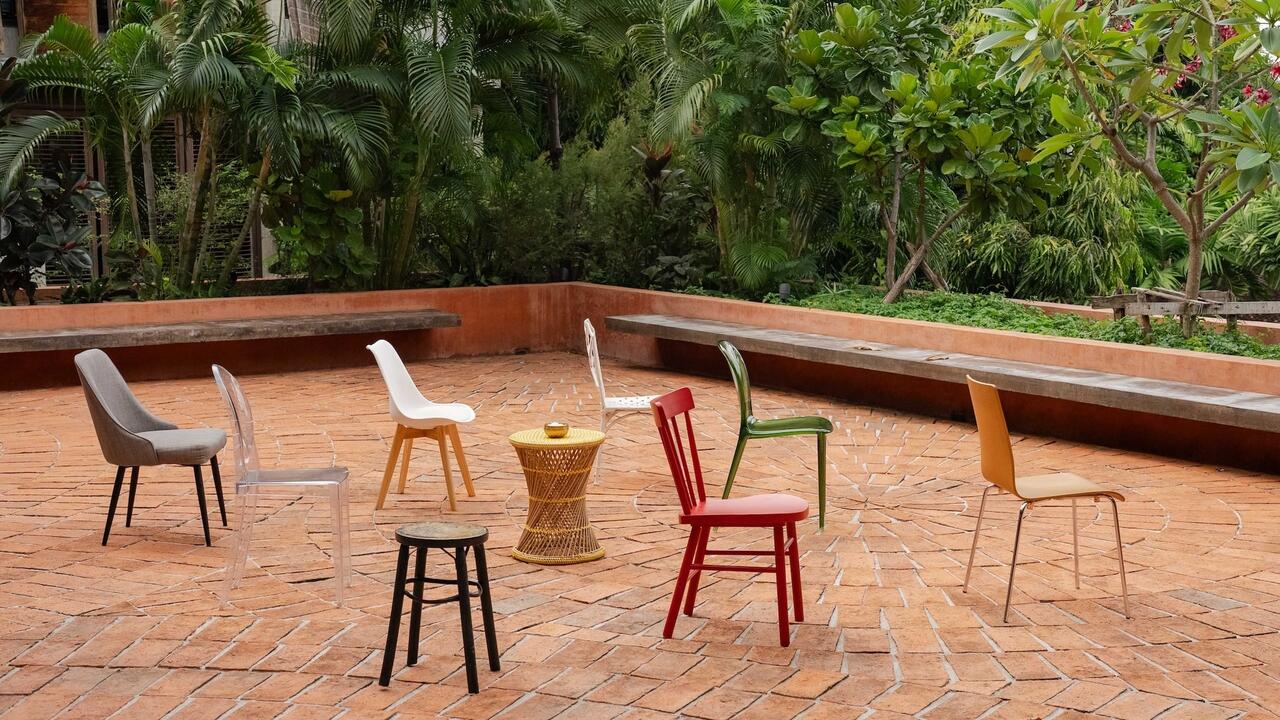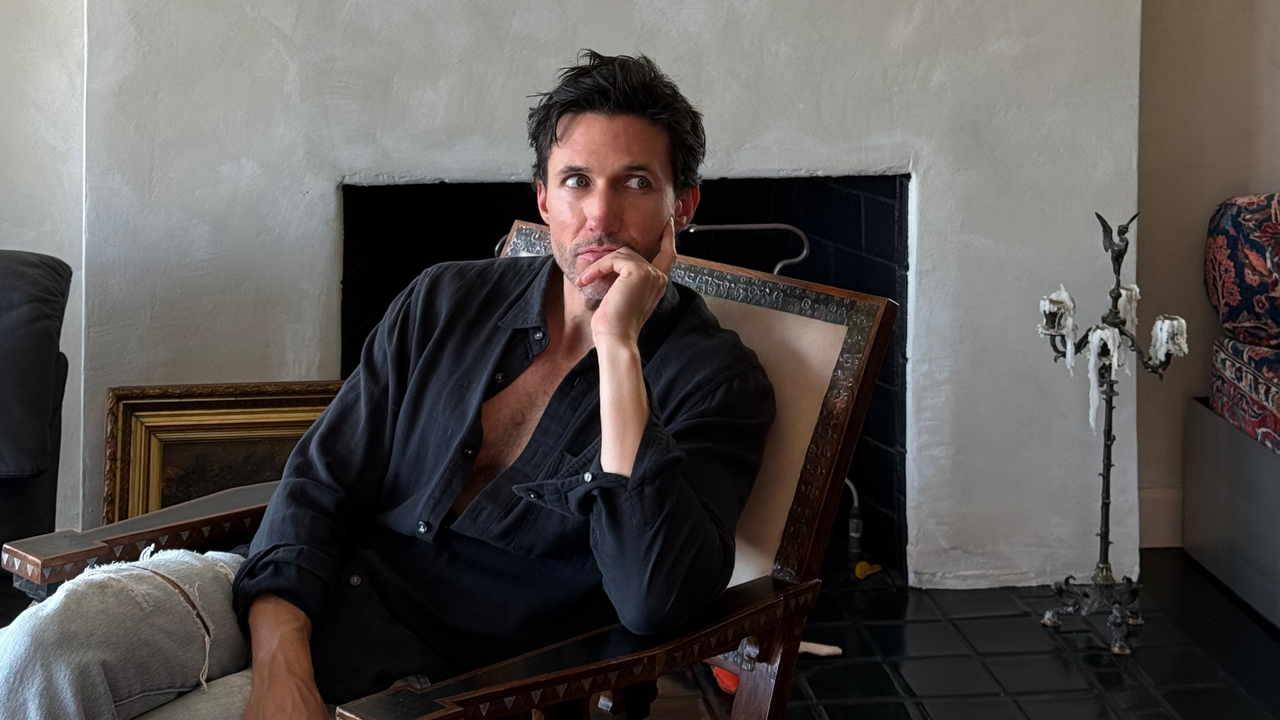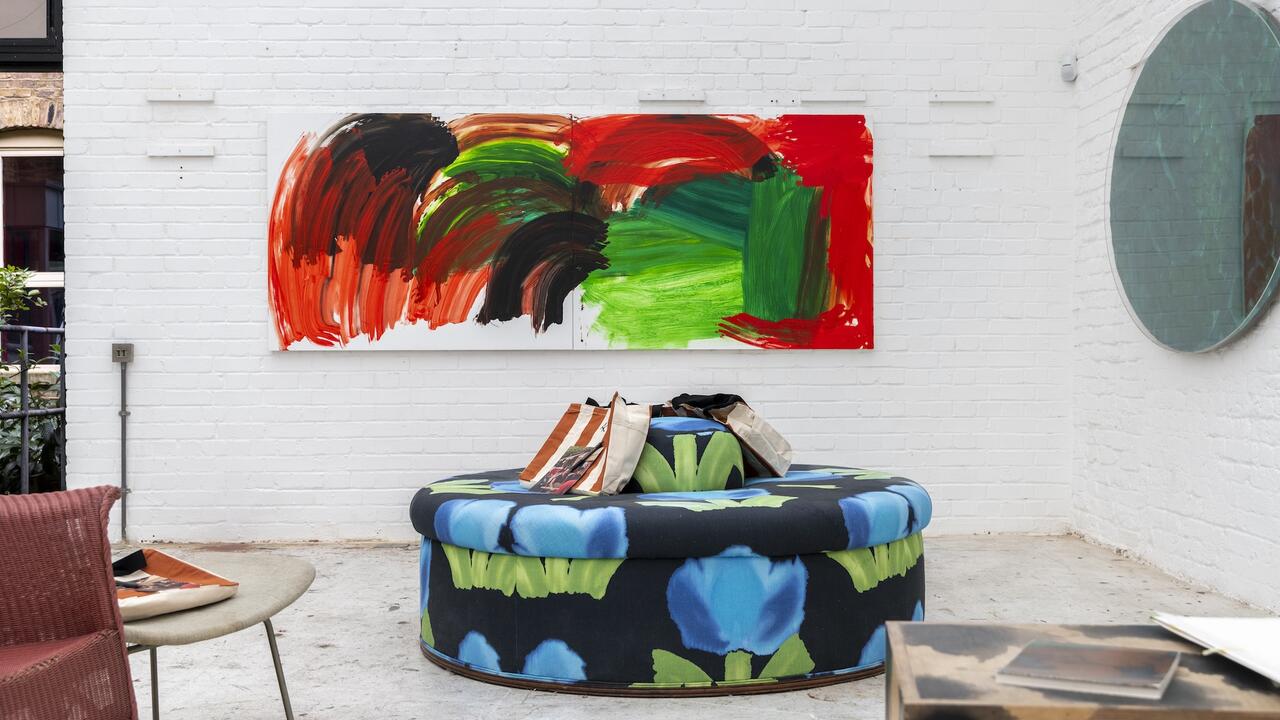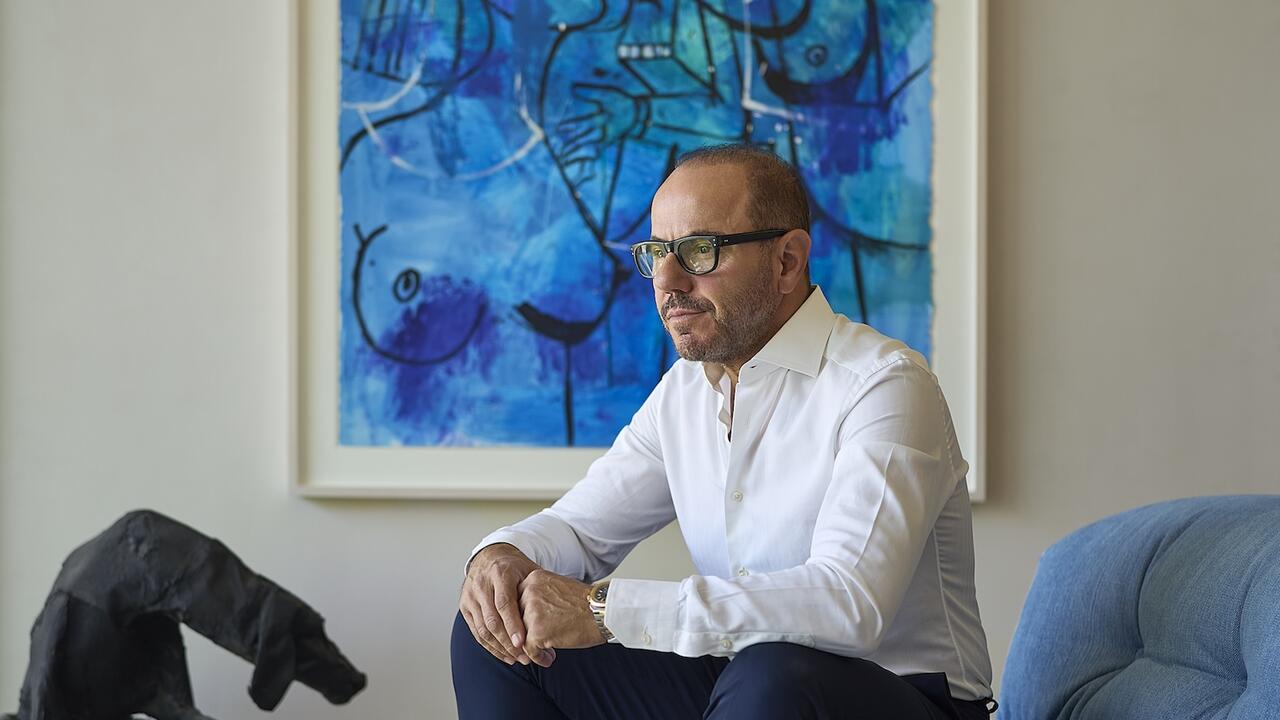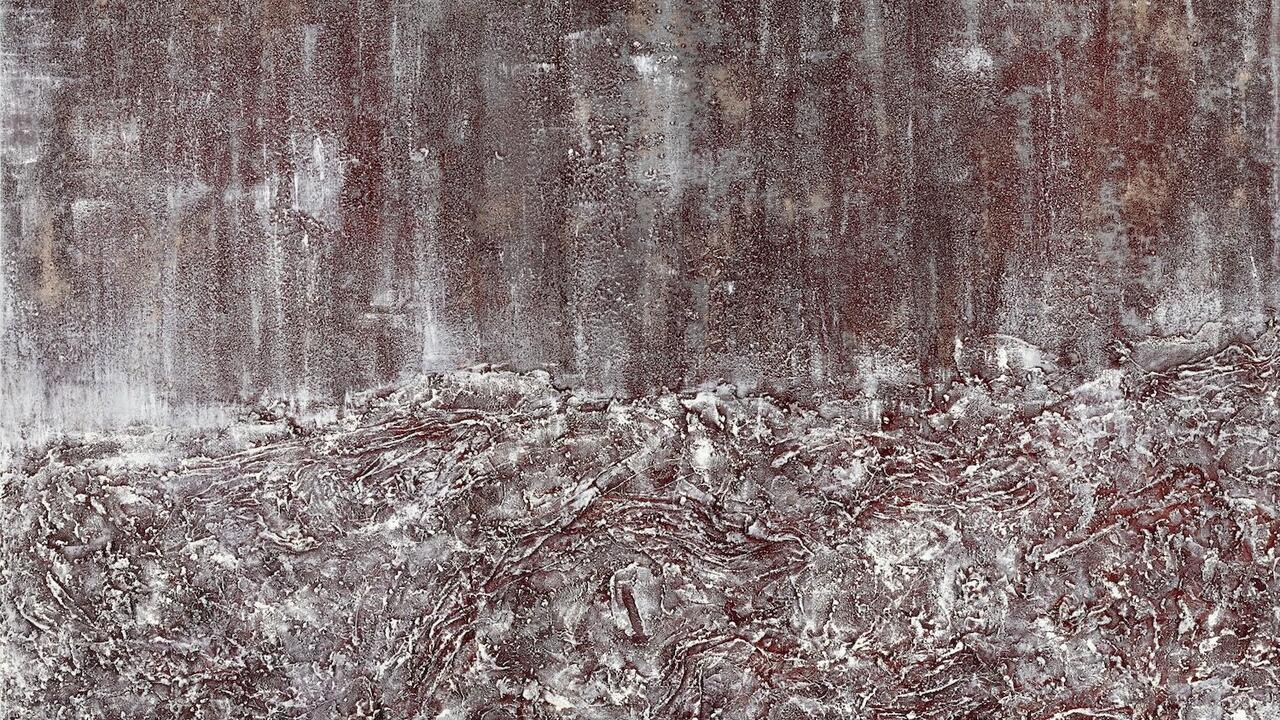People and Places
Craigie Horsfield's 'The City of the People'
Craigie Horsfield's 'The City of the People'
Where in the city is this mild winter sky, the telegraph poles, the wires and bare branches? Almost white, milk-on-white-paper sky, beneath it a corridor of cement walls, broken pavements, weeds. A place that's off the map, a place you'll never visit, an immense grey tragic boredom cruised by an invisible van load of cops.
And then the big panorama: the highway, the pylons, the wet tarmac, the railway the river the sea. Everyone is driving towards a dusk the colour of wet coal. What city is this?
And in which city will we find this laughable statue of a kneeling naked woman, or this equally naked model stretched on her chair? Or the Russian sailor on shore leave in his cheap leather jacket, standing in the isosceles of morning light? Behind him, his ship; before him, a man with a camera. Don't smile, please.
But he almost does. And then we see some, but not all, of what the man with the camera saw.
More. A cloakroom with a tired attendant, the flat authority of his counter. Him behind it, a man with barely a job to do, a man between the hours. Parcels, packages and coats. Next, a container depot, tombed goods in the warehouse. Then a tattered, much-used card index: A20 Andes to Angel. B39 Borde to Borne. C56 Cornell to Corpu. Inventories.
A view from a balcony, the night wrecked by lasers. A grandmother in her apartment; the last time she had her photograph taken was in the 20s. Note the academic drawings, framed behind her on the wall. Her grandson at the other end of the sofa, looking on. Ghosts of Republican troops and armies of Fascists marched through this room, put their feet up, hung around, watched the street below. All quiet now. None of this is in the picture.
A room full of radio announcers - there must be a collective noun for them. An Annunciation? A whine, a drone? A comfort. If you're on the radio, strangers don't come up to you and ask for your autograph - when they hear you speak, it's usually only when you're trying to pay for something in a shop or making some everyday enquiry. They rarely recognise you by your voice alone and if they do, it seems to them rude to comment on its timbre. That's why radio people like photo-opportunities so much, and are always trying to get on television.
We'll never get to the end of the solid buildings, the chairs and tables, the stable things, the endless list of objects; there's no end to it anymore. What the pictures don't show with any certainty is the depth and complexity of the living relationships, although that the pictures contain memory in some way cannot be in doubt. Spill the beans. A boy and a girl seated together in a bar, stilled and stilted in a scene of concocted ennui, borrowed from a 50s French movie. The boy discovered both his parents had boyfriends. Nowadays he's stoned most of the time. Look at him again. The two of them here, they've reached the limit of nothing, of nothing to say. Stay still please, stay as you are. Limite. It is, perhaps, too obvious; we've already gone beyond the limit of the visible.
Then, further into the evening, a man walking on a night-time narrow street. I see not the man himself, whose portrait I barely recall, but an image already up and running in my brain, already fully formed: Dostoevsky's Double, stalking himself through St Petersburg. But it isn't him, ricocheting off the walls, blundering over the cobbles. It is a case of mistaken identity. He's an accidental doppelgänger, and doesn't even know it.
If we don't find these images, we'll get others. They're all the same: we already have too many inside us. Which city was it again?
The salon in the burnt-out opera house was once loud with chat between the acts. The last aria, the sets, the weekend in the mountains, dinner later, last week, yesterday, this afternoon, the day after tomorrow. Illegal deals being struck. For myself, I stand before the photo and remember standing waiting for the interval, then waiting for the end.
This is someone else's city. Here's the queue for the circus, beneath a poster promising elephants. Then the dog-track, then two friends in a billiard hall and a girl in the dance hall, looking up, wary because she knows she's being observed as she rummages in her coat for cigarettes, change, a cloakroom ticket, lipstick, anything. The real people are somewhere else, or if they are here at all, they're slumming it. After all, I've been told, this isn't the real city. I think what is meant is that this place is not fashionable. Some things, supposedly, are more representative than others. But what do they represent?
Here a group of Gitanos posing for a family photograph in the open air, just outside the city limits. Arm around the kid. It's squalid here, but you can see Norman Foster's tower from wherever you are.
A photo of the Parliament, rising at the end of session. All very animated and someone still trying to speak. Jordi Pujol is in there somewhere, but hidden from view. Waited hours for this shot, waited to become invisible, you can tell. A smug guy in an elephant tie in a chair on a chequer-tiled floor: is there something we should know? I was once told that Pujol was the only adult member of his family not to have spent time in a mental institution.
These grab-shots and snapshots (how the photographer would hate that term) and meticulously posed moments (that's more like it), these moments of public and private life, places and non-places, depict aspects of the life of a city. It could be, someone said, Eastern Europe. A coincidence - he did a lot of work in Poland. Never learnt the language.
They used to call the Catalans 'Poles', I think because of the sound of their language (though who came to make the comparison, I don't know), but now some Castillians call them Germans, for a different reason. Phoenicians, Normans, Jews; some in Sicily, Corsica, a street in Istanbul. I heard a Basque referring to himself as Cro-Magnon, though of course all these slurs, even against oneself, are inherently racist. Maybe it was because he liked death metal music, which you hear blaring out from some bars in Bilbao at such a volume that normal human speech becomes impossible.
Where was the famous Mediterranean light? Most days, it rained.
Stepping into a piazza in Pisa many years ago, on the first afternoon of my first visit to Italy, l looked at the shadowed buildings and at the oval of glare at my feet and thought that this must be how Spain looks. I had never been anywhere much, let alone Spain, and suddenly felt a terrible moment of detachment, as though I didn't deserve to be where I was.
Interchangeable, interconnected, interpenetrating, unknowable. Where are the familiar squares, the walk down La Rambla, the places on everyone's itinerary, the postcard opportunities? The Baedeker shots and the ones that prove to all your friends that you were really there, wherever it was: you on the Rialto Bridge, me beside the Taj Mahal. The picaresque drunken moments - Agua de Valencia in a terrace bar on Palm Sunday, Bruges in the rain, mug shot pissed at a party; the chatty police photographer who focused on black eyes and bruises and never sent me a copy. Car crashes and stabbings, and weekends she does Asian weddings.
The last shot has been overdeveloped. And here, this one, who's that woman on the right?
Navigating the world by the co-ordinates of a sentimental journey. This is no timed tour taking in the major sites (Two hours. The cathedral closes at 4.00). Instead: this is the corner where I stood and waited an hour for a friend who never showed. This is the call box I yelled in for hours steaming the glass till I ran out of money. The kiosk where they always have the foreign editions a day late. The little park, the alley of rats beside the expensive hotel. Stories tell us ourselves.
My Place Vendôme is not the same as yours, your Plaça Real will never be mine. They held him over the stairs by his feet, head down and threatened to drop him. He felt one shoe come off and saw it go, felt it bounce off his shoulder-blade and stupidly studied it fall away from him. That was in this square some years ago. Now the authorities have cleaned it up, he can no longer afford to live here.
Here's the place where the tram struck the architect down. The tramlines themselves have been picked out of the stones, but still you can see the imprint of his face; a slight depression.
On my corner of Prince and Spring it is always 3 o'clock one afternoon in August 1979. Walter Benjamin (oh no, not him) saw Marseille, glistening cutlery on a white-clothed table, through a hashish haze. In Frank O'Hara's Lunch Poems the poet is still on an eternal lunch break. Robert Frank's arrested America - the cops kept him in a cell while they checked his papers, thought he was a Commie because he had an accent (Frank is Swiss) and wanted to impound his negatives. 'Don't print them, you'll destroy them.'
Serge Larrain's Valparaiso, with its endless steps, the drinks and paid-for kisses, dry-docked dressing rooms with vertiginous flocked walls and too high ceilings. A boy walking with more pride than hope, a man in a filthy raincoat, passing this way and that, a fish-wife, brittle sunlight over the Magellan Straight, freezing wind, a felt of dust, thin dresses, stockings round a girl's ankles. Sharp shadows breaking up the concrete stairwell. The whole thing underwritten and woven in by Pablo Neruda's text. Did I see all this, mis-remember it or make it up?
There are stories which are private and entirely personal. But they're just waiting for someone with a little sliver of ice, like a knife in the pocket, to come and dig them out. It is hard to make moral distinctions.
There's no absolute black, no absolute white. A sliding infinitude of full-colour greys. Crisp pinpoint of light on the man's eyeball, but when I try to meet his gaze l lose myself in the imperceptible blur which detaches itself from a spot just above the bridge of his nose and follows me around his features like a mischievous fuzzy ball. I want to laugh out loud but he'll never see what the joke is.
I cannot narrate these photographs. l am always somewhere else, separated from their endless present, caught in my own time. l look at the pictures, but cannot enter their space. I have stood on different balconies. Craigie Horsfield has tried to record certain aspects of Barcelona, has listened to some of its residents, has taken advice, has been given directions. But, of course, he took himself with him when he hoisted his gear into the taxi, stood at the door, waited for an interpreter to explain his visit. We try to put ourselves in the picture, at the centre of things, but always end up on the periphery. The people in his photographs are neither the subjects nor the object of his being there. We expect from the photographer a certain empathy, perhaps nothing more than a shared humanity (whatever that is), even when he knows the guy he's homing in on is a renowned shit, a fixer, a rude bastard, a cunt.
The camera controls the moment. Artists and writers have ideas, adopt positions like everybody else - but in the end ideas don't make art. Ideas make statements.
And when, on the street or at some famously photogenic site, you find yourself about to step into someone else's frame, to pass between the lens and what it points at, there is a conscious moment when you decide whether or not to enter the camera's cone of vision. Whether to duck, go round the back or wait. It is embarrassing to wait., but we do it anyhow. And if the camera is pointing at someone, rather than a monument or a scenic view, when the subject notices your presence and your discomfort they change their expression and that's what the camera records. Like it or not, you're in the picture. And when you look at photographic images they end up in you, so perhaps the situation is reciprocal. It seems like a fair deal, and we all end up significant strangers in other people's lives. And this is where some stories, and most relationships begin.





